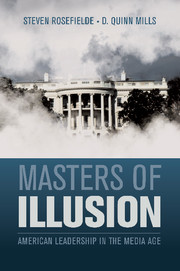Book contents
- Frontmatter
- Contents
- List of Tables and Figures
- Preface
- Acronyms
- Executive Summary
- Acknowledgments
- PART I NATIONAL SECURITY IN THE NEW AGE
- PART II AMERICAN PUBLIC CULTURE AND THE WORLD
- PART III AMERICAN PUBLIC CULTURE AND OURSELVES
- PART IV THE RECONFIGURATION OF NATIONAL WEALTH AND POWER
- PART V VORTEXES OF DANGER
- 11 A Witch's Brew of Troubles: The Next Big Wars
- 12 The Middle East
- PART VI THE AMERICAN RESPONSE
- PART VII LEADING TOWARD PEACE
- PART VIII AMERICAN PRESIDENTIAL LEADERSHIP
- Notes
- Glossary
- Bibliography
- Index
11 - A Witch's Brew of Troubles: The Next Big Wars
Published online by Cambridge University Press: 31 July 2009
- Frontmatter
- Contents
- List of Tables and Figures
- Preface
- Acronyms
- Executive Summary
- Acknowledgments
- PART I NATIONAL SECURITY IN THE NEW AGE
- PART II AMERICAN PUBLIC CULTURE AND THE WORLD
- PART III AMERICAN PUBLIC CULTURE AND OURSELVES
- PART IV THE RECONFIGURATION OF NATIONAL WEALTH AND POWER
- PART V VORTEXES OF DANGER
- 11 A Witch's Brew of Troubles: The Next Big Wars
- 12 The Middle East
- PART VI THE AMERICAN RESPONSE
- PART VII LEADING TOWARD PEACE
- PART VIII AMERICAN PRESIDENTIAL LEADERSHIP
- Notes
- Glossary
- Bibliography
- Index
Summary
A great power can be constrained only by another great power or potent coalition. When a great power is surrounded by weak states (as are both China and Russia today, with the exception of each other), the result is often aggrandizement by the great power, if not open aggression. And conflict of the great powers, when it comes, is the greatest danger mankind faces. For this reason it is essential always to keep our eye first and foremost on the great powers.
Woodrow Wilson made this basic mistake at the end of World War I and thereby contributed to the making of World War II. He believed that the dissatisfaction of minorities within polygot empires was the basic cause of the war (after all, didn't a Serbian nationalist assassinate the heir to the throne of the Austrian Empire and thereby occasion the war?). So he worked for the dissolution of the Austrian and European parts of the Russian empire; but left the German empire (made up of a single nationality) intact. Thus, he surrounded Germany with weak states, providing the temptation and opportunity for Hitler.
We are in danger of doing the same now. We are taking our eyes off the great powers, and looking instead at issues like terrorism.
We rationalize this to ourselves by three devices:
We pretend to ourselves that the atomic arsenals of the great powers are somehow no longer dangerous. We tell ourselves there will be no conflict of the great powers, insisting again, as before World War I, that increasing trade and improving economies make war impossible (harmonism); we tells ourselves that Russia and China are becoming like ourselves, so the likelihood of war disappears (convergence); thus the harmonist and convergence illusions mislead us.
[…]
- Type
- Chapter
- Information
- Masters of IllusionAmerican Leadership in the Media Age, pp. 235 - 263Publisher: Cambridge University PressPrint publication year: 2006

